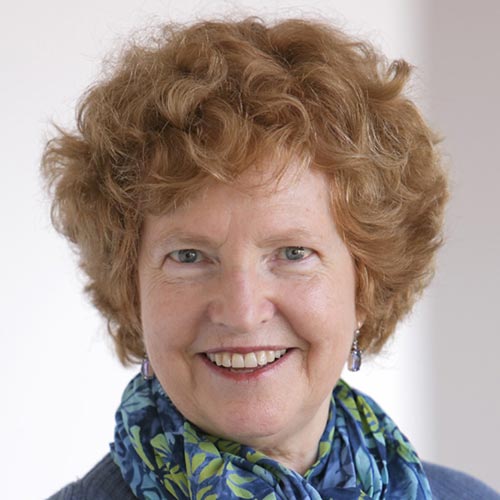In order to participate, register by clicking the RSVP button above or by emailing programs@smithcenter.org.
with Julia Rowland, Ph.D

Hearing the words, ‘there is no evidence of disease,’ may not be fully reassuring when cancer treatment ends. Worry that you may still have cancer (or develop it again!) can be overwhelming. Fear of cancer recurrence is the most common long-term effect of living with a history of cancer. If this is true for you, you are not alone. Come learn about the triggers of fear, and simple tools you can use to tame your own worry demon and reclaim your plans for the future.
About Julia H. Rowland, Ph.D.

Julia Rowland, PhD, who joined Smith Center in October 2017, comes to this position as a long-time clinician, researcher and teacher in the area of psychosocial aspects of cancer. She has worked with and conducted competitively funded research among both pediatric and adult cancer survivors and their families, and published broadly in psycho-oncology, including co-editing, along with Dr. Jimmie Holland, the ground-breaking text, Handbook of Psychooncology. She has also been a frequent speaker on cancer survivorship, or life after cancer, for both professional and lay audiences.
Julia received her PhD in Developmental Psychology from Columbia University and completed a post-doctoral fellowship at Memorial Sloan-Kettering Cancer Center in psychosocial oncology. While at MSKCC, where she held joint appointments in pediatrics and neurology, Julia helped to develop and was the first Director of the Post-Treatment Resource Program, one of the first non-medical survivorship care programs to be offered by a major cancer center in the U.S. In 1990 she moved with her husband and two young children to Washington, DC to become founding Director of the Psycho-Oncology Program at Georgetown University and the Lombardi Cancer Center. There she helped expand services to meet the psychosocial needs of cancer patients and families, launched some of the first quality of life clinical trials, and also introduced a program to enable first year medical students to learn the art of caring for those living through and beyond cancer from survivors themselves and Lombardi faculty. Nine years later, in September of 1999, she was recruited to the National Cancer Institute to become the first, full-time Director of the Office of Cancer Survivorship, a position in which she served for 18 years, championing the growth of survivorship research and care, before stepping down in September 2017 to assume her new role at Smith Center. Although new to the team, Julia is no stranger to Smith Center. She knew Smith Center’s founder, Barbara Smith Coleman, and has volunteered her expertise across the years as a speaker, group leader and staff member for both the 1-day and weeklong residential retreats. Julia brings to her new role a passion to translate what research has taught us about healing in the context of cancer to the broader community, in essence, taking the science of survivorship from the lab bench to the park bench.
In order to participate, register by clicking the RSVP button above or by emailing programs@smithcenter.org.

with Julia Rowland, Ph.D

Hearing the words, ‘there is no evidence of disease,’ may not be fully reassuring when cancer treatment ends. Worry that you may still have cancer (or develop it again!) can be overwhelming. Fear of cancer recurrence is the most common long-term effect of living with a history of cancer. If this is true for you, you are not alone. Come learn about the triggers of fear, and simple tools you can use to tame your own worry demon and reclaim your plans for the future. This program is offered in partnership with the Washington Cancer Institute at Medstar Washington Hospital Center.
About Julia H. Rowland, Ph.D.

Julia Rowland, PhD, who joined Smith Center in October 2017, comes to this position as a long-time clinician, researcher and teacher in the area of psychosocial aspects of cancer. She has worked with and conducted competitively funded research among both pediatric and adult cancer survivors and their families, and published broadly in psycho-oncology, including co-editing, along with Dr. Jimmie Holland, the ground-breaking text, Handbook of Psychooncology. She has also been a frequent speaker on cancer survivorship, or life after cancer, for both professional and lay audiences.
Julia received her PhD in Developmental Psychology from Columbia University and completed a post-doctoral fellowship at Memorial Sloan-Kettering Cancer Center in psychosocial oncology. While at MSKCC, where she held joint appointments in pediatrics and neurology, Julia helped to develop and was the first Director of the Post-Treatment Resource Program, one of the first non-medical survivorship care programs to be offered by a major cancer center in the U.S. In 1990 she moved with her husband and two young children to Washington, DC to become founding Director of the Psycho-Oncology Program at Georgetown University and the Lombardi Cancer Center. There she helped expand services to meet the psychosocial needs of cancer patients and families, launched some of the first quality of life clinical trials, and also introduced a program to enable first year medical students to learn the art of caring for those living through and beyond cancer from survivors themselves and Lombardi faculty. Nine years later, in September of 1999, she was recruited to the National Cancer Institute to become the first, full-time Director of the Office of Cancer Survivorship, a position in which she served for 18 years, championing the growth of survivorship research and care, before stepping down in September 2017 to assume her new role at Smith Center. Although new to the team, Julia is no stranger to Smith Center. She knew Smith Center’s founder, Barbara Smith Coleman, and has volunteered her expertise across the years as a speaker, group leader and staff member for both the 1-day and weeklong residential retreats. Julia brings to her new role a passion to translate what research has taught us about healing in the context of cancer to the broader community, in essence, taking the science of survivorship from the lab bench to the park bench.
This program is being offered in a hybrid format. It will be hosted in-person at Medstar Washington Hospital Center’s Siegel Auditorium and will also be live-streamed virtually for those who cannot attend in-person. In order to participate, register by clicking the RSVP button above or by emailing programs@smithcenter.org. Please indicate in the notes if you plan to attend virtually or in person.

with Julia Rowland, Ph.D

Hearing the words, ‘there is no evidence of disease,’ may not be fully reassuring when cancer treatment ends. Worry that you may still have cancer (or develop it again!) can be overwhelming. Fear of cancer recurrence is the most common long-term effect of living with a history of cancer. If this is true for you, you are not alone. Come learn about the triggers of fear, and simple tools you can use to tame your own worry demon and reclaim your plans for the future. This program is offered in partnership with the Washington Cancer Institute at Medstar Washington Hospital Center.
About Julia H. Rowland, Ph.D.

Julia Rowland, PhD, who joined Smith Center in October 2017, comes to this position as a long-time clinician, researcher and teacher in the area of psychosocial aspects of cancer. She has worked with and conducted competitively funded research among both pediatric and adult cancer survivors and their families, and published broadly in psycho-oncology, including co-editing, along with Dr. Jimmie Holland, the ground-breaking text, Handbook of Psychooncology. She has also been a frequent speaker on cancer survivorship, or life after cancer, for both professional and lay audiences.
Julia received her PhD in Developmental Psychology from Columbia University and completed a post-doctoral fellowship at Memorial Sloan-Kettering Cancer Center in psychosocial oncology. While at MSKCC, where she held joint appointments in pediatrics and neurology, Julia helped to develop and was the first Director of the Post-Treatment Resource Program, one of the first non-medical survivorship care programs to be offered by a major cancer center in the U.S. In 1990 she moved with her husband and two young children to Washington, DC to become founding Director of the Psycho-Oncology Program at Georgetown University and the Lombardi Cancer Center. There she helped expand services to meet the psychosocial needs of cancer patients and families, launched some of the first quality of life clinical trials, and also introduced a program to enable first year medical students to learn the art of caring for those living through and beyond cancer from survivors themselves and Lombardi faculty. Nine years later, in September of 1999, she was recruited to the National Cancer Institute to become the first, full-time Director of the Office of Cancer Survivorship, a position in which she served for 18 years, championing the growth of survivorship research and care, before stepping down in September 2017 to assume her new role at Smith Center. Although new to the team, Julia is no stranger to Smith Center. She knew Smith Center’s founder, Barbara Smith Coleman, and has volunteered her expertise across the years as a speaker, group leader and staff member for both the 1-day and weeklong residential retreats. Julia brings to her new role a passion to translate what research has taught us about healing in the context of cancer to the broader community, in essence, taking the science of survivorship from the lab bench to the park bench.
This program is being offered virtually through Zoom. In order to participate and receive the Zoom link, register by clicking the RSVP button above or by emailing programs@smithcenter.org.
You will receive the Zoom information no later than the morning of your program.

with Julia Rowland, Ph.D (In Partnership with Hope Connections)

Whether you or a loved one was diagnosed recently or years ago, worry about cancer coming back may be a persistent concern. This conversation will explore factors that affect fear of recurrence, as well as approaches to master this anxiety from an emotional, cognitive and behavioral perspective.
About Julia H. Rowland, Ph.D.

Julia Rowland, PhD, who joined Smith Center in October 2017, comes to this position as a long-time clinician, researcher and teacher in the area of psychosocial aspects of cancer. She has worked with and conducted competitively funded research among both pediatric and adult cancer survivors and their families, and published broadly in psycho-oncology, including co-editing, along with Dr. Jimmie Holland, the ground-breaking text, Handbook of Psychooncology. She has also been a frequent speaker on cancer survivorship, or life after cancer, for both professional and lay audiences.
Julia received her PhD in Developmental Psychology from Columbia University and completed a post-doctoral fellowship at Memorial Sloan-Kettering Cancer Center in psychosocial oncology. While at MSKCC, where she held joint appointments in pediatrics and neurology, Julia helped to develop and was the first Director of the Post-Treatment Resource Program, one of the first non-medical survivorship care programs to be offered by a major cancer center in the U.S. In 1990 she moved with her husband and two young children to Washington, DC to become founding Director of the Psycho-Oncology Program at Georgetown University and the Lombardi Cancer Center. There she helped expand services to meet the psychosocial needs of cancer patients and families, launched some of the first quality of life clinical trials, and also introduced a program to enable first year medical students to learn the art of caring for those living through and beyond cancer from survivors themselves and Lombardi faculty. Nine years later, in September of 1999, she was recruited to the National Cancer Institute to become the first, full-time Director of the Office of Cancer Survivorship, a position in which she served for 18 years, championing the growth of survivorship research and care, before stepping down in September 2017 to assume her new role at Smith Center. Although new to the team, Julia is no stranger to Smith Center. She knew Smith Center’s founder, Barbara Smith Coleman, and has volunteered her expertise across the years as a speaker, group leader and staff member for both the 1-day and weeklong residential retreats. Julia brings to her new role a passion to translate what research has taught us about healing in the context of cancer to the broader community, in essence, taking the science of survivorship from the lab bench to the park bench.





